Great tips for fool-proof Asian-style pork
LEARN how to cook sensational pork dishes – from crispy or braised, to stir-fry.
Best of Melbourne
Don't miss out on the headlines from Best of Melbourne. Followed categories will be added to My News.
- Best cafes in Melbourne’s west
- Best cafe’s in Melbourne’s south east
- Chefs’ best cheap eats
- Our best city restaurants
PORK has the sort of impact on people you will see with few other foods. In most cases, it is a source of joy and wonder. The irresistible morning aroma of sizzling bacon, the crunch of golden, puffed crackling, the oohs and aahs that accompany the arrival of the Christmas ham.
Occasionally, however, pork can be a little unsettling. All that wobbly fat in a Chinese hotpot, for instance. Or downright scary, like the pig’s head legendary chef Cheong Liew has hanging from his veranda as it cures.
All of which points to the amazing versatility of the meat, particularly when it is in the hands of some of the country’s best Asian chefs.
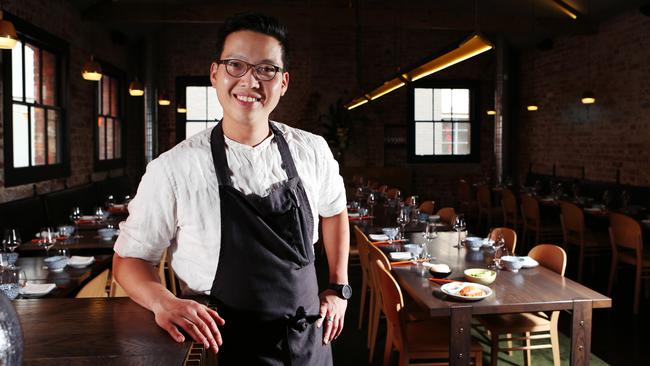
“It’s my number one meat,” says Victor Liong, from CBD hotspot Lee Ho Fook. “You can cook it any way — that’s one of the most exciting parts. I cook a lot of pork and I eat a lot of pork — you don’t get this physique unless you do that.”
Nic Watt, the well-travelled chef behind Madame Hanoi in Adelaide, is another fan of the sweet meat, at work and home.
“It is great value compared with other meats, particularly beef,” he says. “And it’s a more consistent product in its flavour and texture.
“And one thing you get on pork that you don’t get on other meats is the crackling, which is pretty hard to go past.”
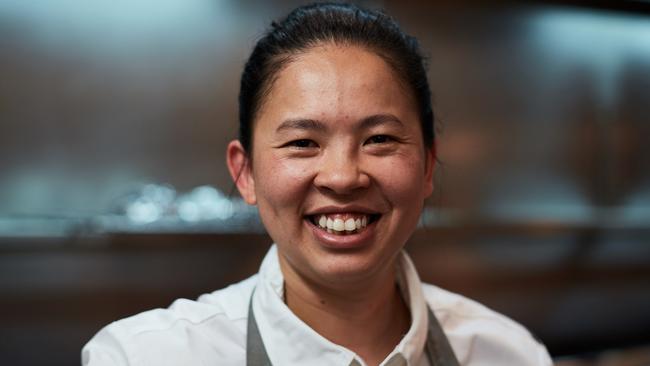
Thi Le, whose Richmond restaurant Anchovy reflects both her Vietnamese upbringing and experience in contemporary Australian kitchens, is another fan.
At home she makes a soup with pork short ribs that produces a lovely broth and sweet meat to eat off the bone. At Anchovy, her mum’s recipe for barbecued pork chops is a regular on the menu.
“It is so versatile,” adds Cheong, whose famous dish of pork hock and wood fungus was a mainstay of his menus at Neddy’s and then The Grange.
Here they share their pork secrets, starting with the crackling, of course.
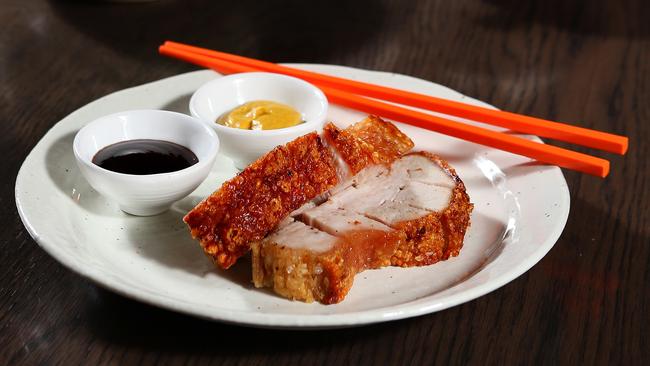
CRACKLING 1
Victor can’t wait to share his discovery. “I’ve nailed the best ever crackling to cook at home,” he says. This is his new method.
Steam pork belly for an hour. Cover the skin side with rock salt and put into the oven at 180C for 30 minutes, which removes some of the moisture. Brush off the salt and heat the oven to 235C and put it in for another 30 minutes.
“You will have perfect crackling and perfect meat,” he enthuses. “It’s the perfect roast.”
And what does he do with the roasted belly? “If you’re lazy like me, you will get some kimchi from the supermarket and eat it in a sandwich,” he says.
“Cabbage and pork are best friends — so make a coleslaw with heaps of herbs and a light dressing and make it Vietnamese; get some sauerkraut and go German, or a rocket salad with balsamic and make it Italian.”
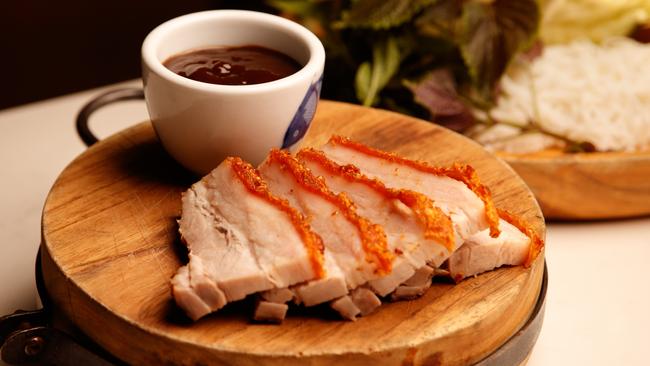
CRACKLING 2
For Nic, the secret to good crackling is the preparation. “You need to start with a really good, close crisscross scoring that allows the fat to render up in lots of areas,” he says.
“Rub with salt and vinegar — the salt dries out the skin, and the vinegar starts to break down the fat. Leave in the fridge to dry out — we leave our whole bellies for a few days if we can.”
“Put in the oven at a high temperature to blast the crackling and it will crisp beautifully, then cook at a lower heat. When you get that true, crunchy crackle, it’s magnificent. I’m salivating thinking about it.
“Serve it in iceberg lettuce cups, fresh herbs, hoisin sauce, fresh chilli and rice noodle. It’s beautiful. That’s how we cook it in the restaurant and how I do it with my family.”
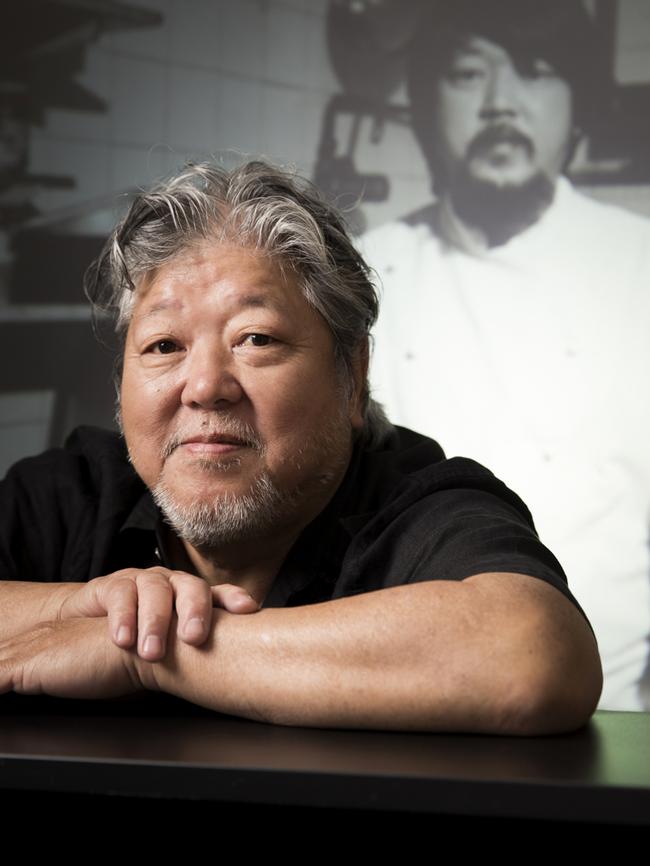
MORE BELLY
Thi: Braise it in coconut water with caramel and fish sauce. The coconut adds a sweetness to the pork and more depth.
Cheong: Cut the belly meat into pieces, marinate with red bean paste, ginger juice and egg, roll in flour and deep fry. Or steam in rice wine and soy sauce for a long time and it will melt in your mouth.
Victor: Take the skin off, slice belly meat into thin slices and grill quickly. If you are cooking with charcoal you don’t have to wait until it cools off ... just use it while it is hot.
Or, cut pork belly (including skin and bone) into bite-sized pieces and braise Shanghai style with dried chilli, lots of garlic, soy, black vinegar and sugar.
“Cook it down until it is like a glaze and the fat has a bouncy, gelatinous texture. When you are a kid, sweet and fatty stuff like this is the best.”
RIBS
Nic: Make up a master stock starting with water, bay leaves, orange, cinnamon, star anise, a little soy and perhaps mirin and fish sauce for the umami.
Put ribs and stock in a shallow roasting dish, covered with foil, in a low oven (about 120C) for about 40 minutes. Allow ribs to cool in stock so all the flavour soaks into the meat and the meat firms up.
Do this a day or two before. When you want to serve, cook on a barbecue or grill, brushing with a baste of hoisin, mustard, sesame seeds and chilli sauce until it is covered in a sweet, lacquery glaze. Serve with toasted cashew nuts and spring onions tossed over the top.
“Find the right beer and you are done.”
Cheong: Cut ribs into small pieces and cook in a hot pot with black beans, garlic, ginger, chilli and brown beans.
Thi: Marinate American-style ribs in hoisin and barbecue them.
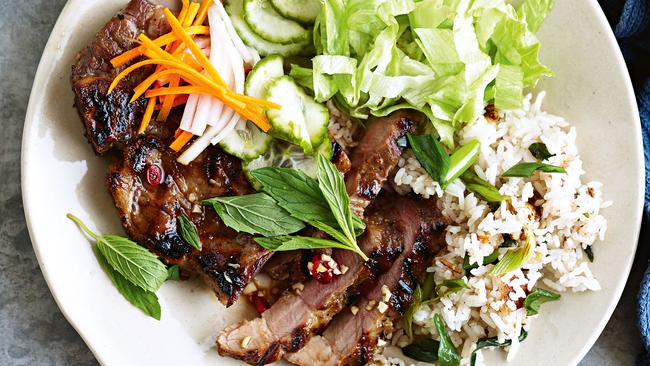
PORK CHOPS
Thi: My mum’s marinade for pork chops is now a regular at Anchovy. Mix together oyster sauce, a little Coke, chilli, garlic, lemongrass, fish sauce and a little sugar, marinate chops for 24 hours and throw on the barbecue. At Anchovy, they are served with pickled apple eggplant and red cabbage.
PORK LOIN CUTLETS
Nic: Make a marinade with lots of fresh herbs — basil, Vietnamese mint, coriander — chopped up with lemon zest and mix with olive oil and cracked pepper. Marinate for a couple of hours and grill on the barbecue. “For my wife and I, I will add fresh chilli, for the kids I leave it out. When pork is on the bone like that, you get the really sweet meat.”
FILLET
Victor: Cut into strips a little thinner than your pinky finger. Season with salt and a little sugar, grate garlic and ginger over the top, add sesame oil, Shaoxing rice wine and a pinch of cornflour. Mix it through and allow to marinate for 20 minutes.
Use this as a starting point for a stir-fry with any leafy or stalky green. Even celery and shiitake. Heat up the wok with a little oil, fry pork until it is opaque, add vegies and deglaze with Shaoxing and oyster or soy sauce. “That’s Wednesday night dinner ... easy. That’s the best part about pork fillet ... it’s quick and easy.”
Cheong: When you are cooking with lean pork, tap it with the back of a knife, then marinate with oil and seasoned cornflour. It makes a protective layer on the outside so the meat doesn’t feel dry.
MINCE
Victor: I love making pork meatballs. Put mince in a blender and season with salt and sugar. Add garlic, sesame oil and any crispy vegetables like chopped bamboo shoots. You want to blend it enough that the mixture becomes sticky so the natural protein will help bind it. Scrape it out, form into little balls and add to soup, cook in a hotpot or deep fry.
“I like them simmered in a soup with cabbage, shiitake and a little miso.”
Nic: Pork mince makes a beautiful filling for dumplings. You are cooking the dumpling right through but that little bit of fat keeps it moist and juicy. Add five spice and fresh herbs. For pot sticker or soup style dumplings, it’s beautiful.
Thi: Stir-fry pork mince with basil, snake beans and chilli jam.
SHOULDER
Victor: Cut shoulder meat into pieces and cook it slowly with onion, garlic, ginger, chicken stock and white wine. From there you can go in many directions. Soy sauce, mirin and a little sesame oil will make it Japanese-y, while fish sauce and lemongrass make it southern Asian.
ROAST PORK
Visit a Chinese or Vietnamese shop specialising in barbecued meats and buy some roast pork. Midweek dinners can be ready in a flash.
Victor: Mum’s trick with roasted pork was to make it last for two meals. On day one, serve with steamed greens (cooking them in a microwave for a minute and a half with a splash of water and dress with oyster sauce and a little sesame oil). The next day stir-fry the leftovers with broccoli and ginger, or cabbage and garlic.
OTHER BITS
Victor: Simmer the ears in an aromatic broth until they are very soft. Refrigerate and then slice thin for extra texture in a salad or crumb and deep fry and eat like a schnitzel.
Cheong: For the famous Neddy’s dish, the pork hocks are boiled, marinated in soy, ginger and rice wine, and deep fried until the skin is crisp. Then they are braised with brown beans, bean curd, hoisin and chilli sauce so the flavour is absorbed into skin and “the skin becomes more delicious than the meat itself”. Find the recipe online.
Thi: “Pork liver is really, really delicious. Shave it into slices of about half a centimetre. Stir-fry in a hot wok with oyster sauce, fish sauce, lots of pepper, garlic chives and bean sprouts. It’s such a more-ish dish.”
Cheong: “My grandma used to cut the fat from belly pork into little pieces the size of a 50c coin. Then she would pound it, season with five spice, salt, ginger juice and rice wine and deep fry in batter. That is the yummiest fried pork you can get. When you crunch into it the fat runs down both sides of your cheeks. It is so delicious — it’s dangerous.”
If you are really game, follow Cheong’s method for a pig’s head. Remove the pig’s cheeks and the rest of the face from the bone and marinate in soy and rice wine. Coat in lots of chilli and hang out to dry. “In the middle of winter, I will be using this in my stir-fries,” he says.
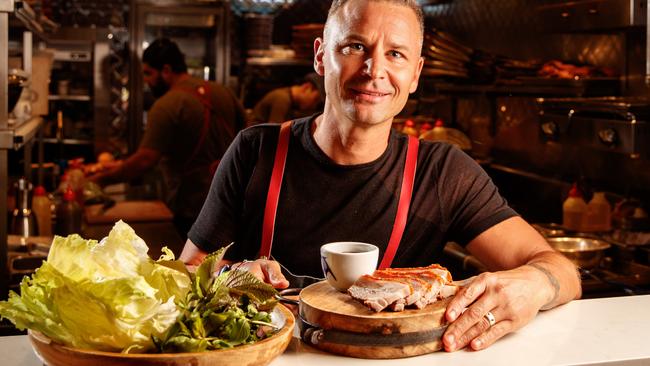
CRISPY PORK BELLY, LETTUCE CUPS & FRAGRANT HERBS
Serves 4
Prep 30 minutes, plus overnight to dry in fridge
Cook 2 hours
Ingredients
400g pork belly
Rub for meat
100g five-spice powder
20g salt
Rub for skin
100g table salt
200ml white vinegar
To serve
Iceberg lettuce cups
Fragrant herbs (coriander, Vietnamese mint, basil, etc)
Hoisin sauce
Rice noodles, soaked
1 Use a sharp blade, such as a box cutter, to score close crisscross marks into the pork belly skin, taking care not to cut through into the meat.
2 Rub the meat side with enough of the five spice and salt to cover, but not too much, as it can burn very quickly.
3 Rub the scored skin with some of the salt and white vinegar. Place on a tray on top of a wire rack and leave in the fridge to dry the skin. The longer you leave it, the better.
4 Preheat oven to 250C. Rub more salt and vinegar on the skin. Cook pork for 25 minutes, keeping an eye out for colour. Once the skin has crackled, turn the oven down to 180C for a further 30 minutes.
5 Leave pork to rest for 30 minutes before carving. Serve with freshly washed iceberg lettuce cups, fragrant herbs, hoisin sauce and rice noodles.
Recipe: Nic Watt, Madam Hanoi, Adelaide
Photography: Matt Turner


